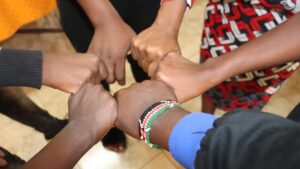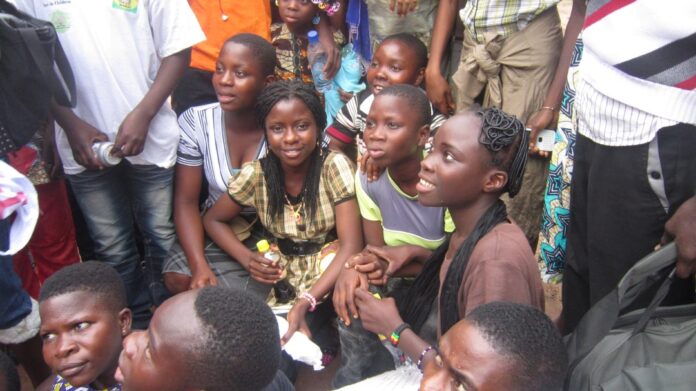La commémoration de la Journée mondiale de l’enfance s’est tenue, ce 20 novembre 2022. Les enfants africains appellent à des solutions locales, y compris la création de Fonds africains pour les enfants africains. Ils arguant que de la même manière que les gouvernements africains donnent la priorité au développement. Selon eux, ils devraient investir dans les enfants, car le développement que nous recherchons ne peut être réalisé que si nous investissons dans les enfants.
Par Mame Khady NDAO
Dans le monde d’aujourd’hui, les enfants africains sont les premières victimes de la crise multiple du Covid, du conflit, de l’inflation et de la guerre en Ukraine. En octobre 2022, le Maejt a interrogé 335 enfants qui travaillent, dont 193 filles et 142 garçons âgés entre 9 et 18 ans, une moyenne d’âge de 15 ans, dans 63 endroits pour déterminer leurs conditions de vie.
Les enfants, en partenariat avec le Groupe régional de protection de l’enfance de l’Afrique de l’Ouest (Grpe), appellent les parties prenantes suivantes à agir d’urgence. Il importe, pour eux, allouer 2 % de leur budget au suivi de l’allocation budgétaire à la mise en œuvre de la politique des droits de l’enfant dans ses États membres par l’intermédiaire d’un observatoire régional des droits de l’enfant.
Dans le monde d’aujourd’hui, les enfants africains sont les premières victimes de la crise multiple du Covid, du conflit, de l’inflation et de la guerre en Ukraine. En octobre 2022, le Maejt a interrogé 335 enfants qui travaillent, dont 193 filles et 142 garçons âgés entre 9 et 18 ans, une moyenne d’âge de 15 ans, dans 63 endroits pour déterminer leurs conditions de vie.
L’étude menée par le Maejt révèle que l’état actuel de l’économie mondiale a un impact direct sur la vie des enfants, de leurs familles et d’autres groupes vulnérables. Si les États et les partenaires de l’aide au développement ne font pas attention, les risques d’exploitation et de mobilité transnationale des mineurs augmenteront et deviendront incontrôlables. Un garçon de 16 ans interrogé dans l’enquête de l’étude à Fada Ngourma, au Burkina Faso, a déclaré: «Je suis sûr que certains de mes camarades de classe rejoindront d’autres dans les sites d’extraction d’or.»
Comment le continent pourra-t-il assurer son développement si les enfants africains abandonnent les milieux éducatifs et optent pour les pires formes de travail pour survivre? « Oui, nos pays aspirent à plus de développement, mais pour quelles raisons?» Combien les gouvernements africains allouent-ils au développement, aux droits et à la protection des enfants? S’est interrogé un garçon nigérian de 16 ans. «Nos fonds peuvent acheter des bombes nucléaires pour assurer la paix, mais pas pour des initiatives en faveur des droits de l’enfant», a fait remarqué une jeune fille de 16 ans du Niger.
Les enfants africains remettent en question le leadership africain, ils veulent savoir ce que l’État et le secteur privé ont investi dans la prise en charge de leurs préoccupations. « Tant de fois nous avons entendu et vu les gouvernements allemand et suisse allouer des fonds à l’éducation, à la protection et à la formation des enfants africains… il est rare d’entendre ou de voir des gouvernements africains unir leurs forces pour soutenir des initiatives qui bénéficient directement aux enfants. Leurs priorités en matière de dépenses sont l’infrastructure, la politique et l’administration», a dit un garçon ougandais de 15 ans.
La croissance économique ne suffit pas à conduire le changement dont l’Afrique a besoin. Pour que les pays se développent véritablement, pour réduire la pauvreté, construire de bonnes infrastructures et exploiter la paix, les communautés africaines doivent investir dans les droits de l’enfant et les initiatives de protection de l’enfance, éduquer nos jeunes et créer des emplois décents. L’insuffisance des dépenses publiques en faveur des enfants est l’un des principaux obstacles à la réalisation des droits de l’enfant.
Les engagements politiques et législatifs pertinents restent des promesses vides de sens à moins que les gouvernements ne génèrent et n’allouent équitablement des ressources suffisantes pour leur mise en œuvre dans leurs budgets locaux et nationaux, et ne garantissent une utilisation efficace et efficiente des ressources.

High Cost of Living choking the lives of African children – African governments must invest more in children’s protection
African children are bearing the brunt of the multiple crisis of COVID, Conflict, Inflation, and the Ukraine War in today’s world, In October 2022, MAEJT interviewed 335 working children, including 193 girls and 142 boys aged between 9 and 18 years, with an average age of 15 years, in 63 locations to determine their living conditions. The study conducted by MAEJT reveals that the current state of the world’s economy is directly impacting the lives of children, their families, and other vulnerable groups. If States and development aid partners are not careful, the risks of exploitation and transnational mobility of minors will increase and get out of hand. A 16-year-old boy respondent in the study survey in Fada Ngourma, Burkina Faso said: « I’m sure some of my classmates will join others in the gold mining sites. » How will the continent’s development be when African children abandon educational settings and opt for the worst forms of child labour in order to survive? « Yes, our countries strive for more development, but for what reasons? » How much do African governments allocate for children’s development, rights, and protection? A question from a 16-year-old Nigerian boy. “Our funds can buy nuclear bombs to secure peace, but not for child rights initiatives”, – a 16 years old girl from Niger
African children are questioning African leadership, they want to know what the state and private sectors has invested in them. « So many times we’ve heard and seen the German and Swiss governments allocating funds towards African children’s education, protection, and training….. it’s rare to hear or see African governments joining forces to support initiatives that directly benefit children. Their spending priorities are infrastructure, politics, and administration. » – a 15-year-old boy from Uganda.
Economic growth is not enough to drive the change that Africa needs. For countries to truly develop – to reduce poverty, build good infrastructure, and harness peace, African communities need to invest in children’s rights and child protection initiatives, educate our young people, and create decent jobs. A lack of sufficient, effective, inclusive, and efficient public spending on children is one of the main barriers to the realization of the rights of the child. Relevant policy and legislative commitments remain empty promises unless Governments generate and equitably allocate adequate resources for their implementation in their local and national budgets, and ensure effective and efficient use of resources.
The Convention on the Rights of the Child as well as the African Charter on the Rights and Welfare of the Child both place an obligation on all States parties, including the international community, to mobilize and allocate resources in order to invest in children. These 2 instruments recognize that it is only through government budgets that public services to children, in the areas of health, education, and social protection are realized.
On the commemoration of Universal children’s day on 20th November 2022, African children are calling for homegrown solutions including the establishment of African Funds for African Children, arguing that in the same manner that African governments prioritize development, they should invest in children, because the utopian development we seek can only be realized if we invest in children. Children, in partnership with the West Africa Regional child protection group (GRPE), therefore call for urgent action by the following stakeholders:
The African Union:
• Call on African governments to invest in child rights and protection measures, since this contributes to the harmony, peace, and development that we seek in Africa.
Governments in Africa;
• Increase direct budgets for children’s rights and in particular Child protection and social services to a minimum of 5% of national budgets
• Organize “African Funds for African children” meetings with corporate sectors, African Philanthropies, and foundations to coordinate activities for the implementation of child rights in African countries.
• While States have made efforts to ensure effective investment in children’s rights, States should:
a) Take concrete measures to mobilize domestic and, where necessary, international resources to realize children’s rights; they should also evaluate current revenue sources to ensure that resources are mobilized to the greatest extent possible;
b) Make appropriate budgetary arrangements to assist the realization of all persons within their jurisdiction’s human rights, without discrimination. The enjoyment of economic, social, and cultural rights should be protected to the greatest extent possible within available resources, with the best interests of the child and future generations having precedence.
c) Children’s rights should be prioritized in all budget and fiscal decisions; where resources are restricted, children’s rights should be prioritized, with particular monies directed towards the most disadvantaged and vulnerable groups of children and families;
d) Improve public finance management systems and maintain resource accountability, particularly through internal and external audit mechanisms. Methods for financial supervision and accountability should include mechanisms for compliance and enforcement, as well as remedies, sanctions, and reparations.
e) Ensure budget transparency by making essential budget documents available to the public in a timely way during the yearly budget cycle. To help the people, especially children, comprehend the budget, the government should create a child-friendly citizen’s budget;
f) Ensure a clear and transparent demarcation of budget lines for spending on children. Information should be sufficiently disaggregated to enable children and other stakeholders to identify, extract and track budget line items intended to benefit children;
Regional bodies such as ECOWAS should
• Allocate 2% of their budget to monitoring budget allocation to child rights policy implementation in its member states through a regional child rights observatory.




